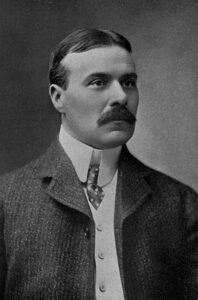
Ailsa Paige, A Novel in Three Episodes
The butler made an instinctive movement to detain him, but he flung him aside and entered the drawing room, the servant recovering his equilibrium and following on the run. Light from great crystal chandeliers dazzled him for a moment; the butler again confronted him but hesitated under the wicked glare from his eyes. Then through the brilliant vista, the young fellow caught a glimpse of a dining room, a table where silver and crystal glimmered, and a great gray man just lowering a glass of wine from his lips to gaze at him with quiet curiosity.
The next moment he traversed the carpeted interval between them and halted at the table’s damask edge, gazing intently across at the solitary diner, who sat leaning back in an arm-chair, heavy right hand still resting on the stem of a claret glass, a cigar suspended between the fingers of his left hand.
“Are you Colonel Arran?”
“I am,” replied the man at the table coolly. “Who the devil are you?”
“By God,” replied the other with an insolent laugh, “that’s what I came here to find out!”
The man at the table laid both hands on the edge of the cloth and partly rose from his chair, then fell back solidly, in silence, but his intent gaze never left the other’s bloodless face.
“Send away your servants, Colonel Arran!” said the young man in a voice now laboring under restraint. “We’ll settle this matter now.”
The other made as though to speak twice; then, with an effort, he motioned to the butler.
What he meant by the gesture perhaps he scarcely realised at the moment.
The butler instantly signaled to Pim, the servant behind Colonel Arran’s chair, and started forward with a furtive glance at his master; and the young man turned disdainfully to confront him.
“Will you retire peaceably, sir?”
“No, but you will retire permanently if you touch me. Be very careful.”
Colonel Arran leaned forward, hands still gripping the table’s edge:
“Larraway!”
“Sir?”
Read or download Book
Robert W. Chambers
Robert William Chambers (May 26, 1865 – December 16, 1933) was an American artist and fiction writer, best known for his book of short stories titled The King in Yellow, published in 1895.
Life
Chambers was born in Brooklyn, New York, to William P. Chambers (1827–1911), a corporate and bankruptcy lawyer, and Caroline Smith Boughton (1842–1913). His parents met when his mother was twelve years old and William P. was interning with her father, Joseph Boughton, a prominent corporate lawyer. Eventually, the two formed the law firm of Chambers and Boughton which continued to prosper even after Joseph died in 1861. Robert Chambers’s great-grandfather, William Chambers (birth unknown), a lieutenant in the British Royal Navy, was married to Amelia Saunders (1765–1822), a great-granddaughter of Tobias Saunders of Westerly, Rhode Island. The couple moved from Westerly to Greenfield, Massachusetts, and then to Galway, New York, where their son, also William Chambers (1798–1874), was born. The second William graduated from Union College at the age of 18 and then went to a college in Boston, where he studied medicine. Upon graduating, he and his wife, Eliza P. Allen (1793–1880), a direct descendant of Roger Williams, the founder of Providence, Rhode Island, were among the first settlers of Broadalbin, New York. His brother was the architect Walter Boughton Chambers.
Chambers was first educated at the Brooklyn Polytechnic Institute and then entered the Art Students’ League at around the age of twenty, where the artist Charles Dana Gibson was a fellow student. Chambers studied in Paris at the École des Beaux-Arts and the Académie Julian from 1886 to 1893, and his work was displayed at the Salon as early as 1889. On his return to New York, he succeeded in selling his illustrations to Life, Truth, and Vogue magazines. Then, for reasons unclear, he devoted his time to writing and producing his first novel, In the Quarter, written in 1887 in Munich. His most famous, and perhaps most meritorious, effort is The King in Yellow, a collection of Art Nouveau short stories published in 1895. This included several famous weird short stories which are connected by the theme of a fictitious drama of the same title, which drives those who read it insane. E. F. Bleiler described The King in Yellow as one of the most important works of American supernatural fiction. It was also strongly admired by H. P. Lovecraft and his circle.
Chambers returned to the weird genre in his later short story collections The Maker of Moons, The Mystery of Choice, and The Tree of Heaven, but none earned him as much success as The King in Yellow. Some of Chambers’s work contains elements of science fiction, such as In Search of the Unknown and Police!!!, about a zoologist who encounters monsters.
Chambers’s main work of historical fiction was a series of novels set during the Franco-Prussian War. These novels were The Red Republic (1895, centering on the Paris Commune), Lorraine (1898), Ashes of Empire (1898), and Maids of Paradise (1903). Chambers wrote Special Messenger (1909), Ailsa Paige (1910), and Whistling Cat (1932), novels set during the American Civil War. Chambers also wrote Cardigan (1901), a historical novel for younger readers, set at the outbreak of the American Revolution. Chambers later turned to writing romantic fiction to earn a living. According to some estimates, Chambers had one of the most successful literary careers of his period, his later novels selling well and a handful achieving best-seller status. Chambers’ romance novels often featured intimate relationships between “caddish” men and sexually willing women, resulting in some reviewers accusing Chambers’ works of promoting immorality. Many of his works were also serialized in magazines.
His novel The Man They Hanged was about Captain Kidd and argued that Kidd was not a pirate but had been made a scapegoat by the British government. During World War I, Chambers wrote war adventure novels and war stories, some of which showed a strong return to his old weird style, such as “Marooned” in Barbarians (1917). After 1924 he devoted himself solely to writing historical fiction. Chambers for several years made Broadalbin, New York, his summer home. Some of his novels touch upon colonial life in Broadalbin and Johnstown. On July 12, 1898, he married Elsa (Elsie) Vaughn Moller (1872–1939). They had a son, Robert Edward Stuart Chambers (1899–1955) (who sometimes used the name Robert Husted Chambers).
Robert W. Chambers died on December 16, 1933, after having undergone intestinal surgery three days earlier.






